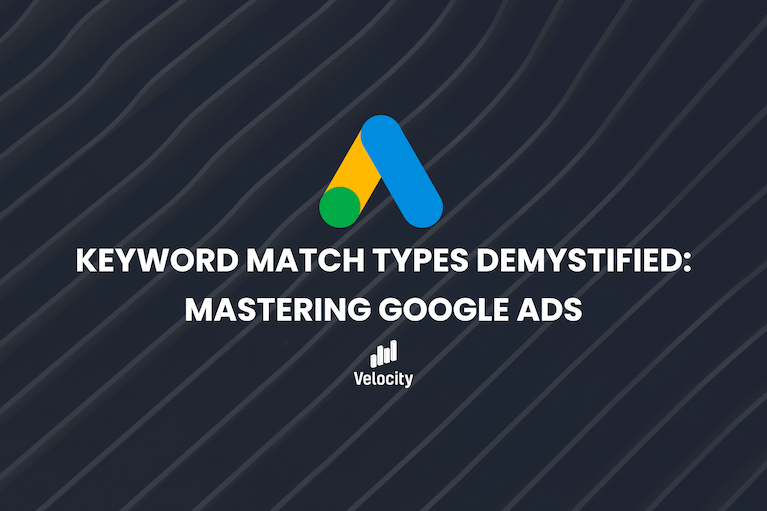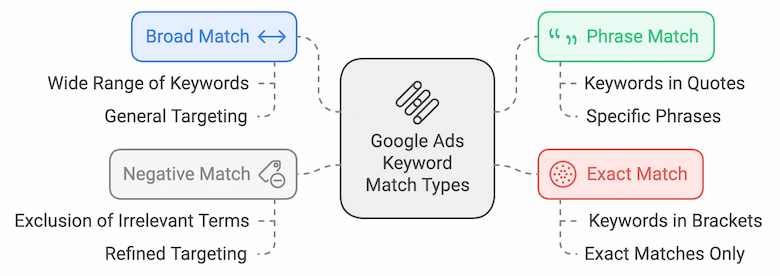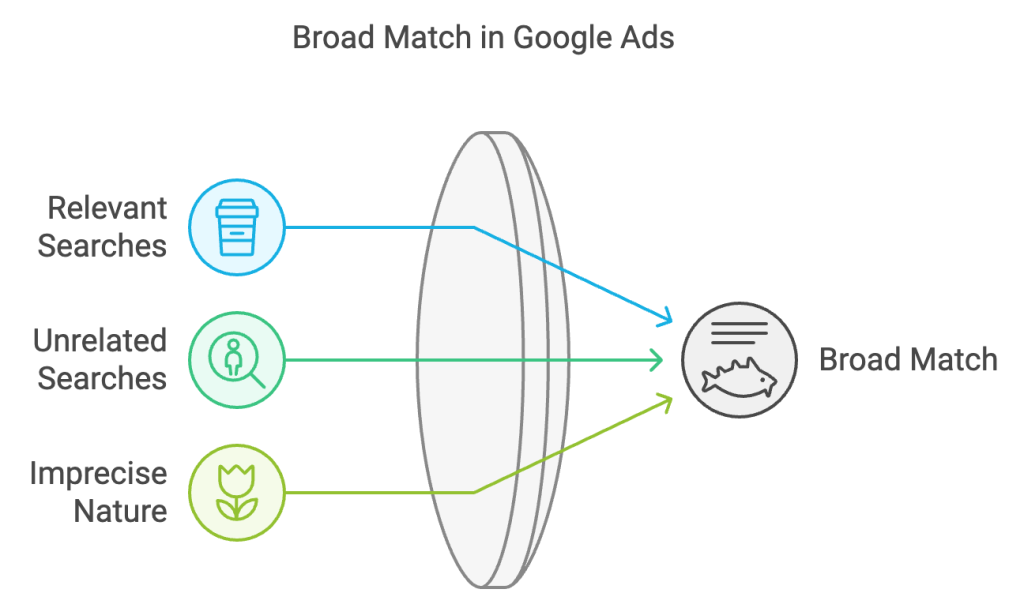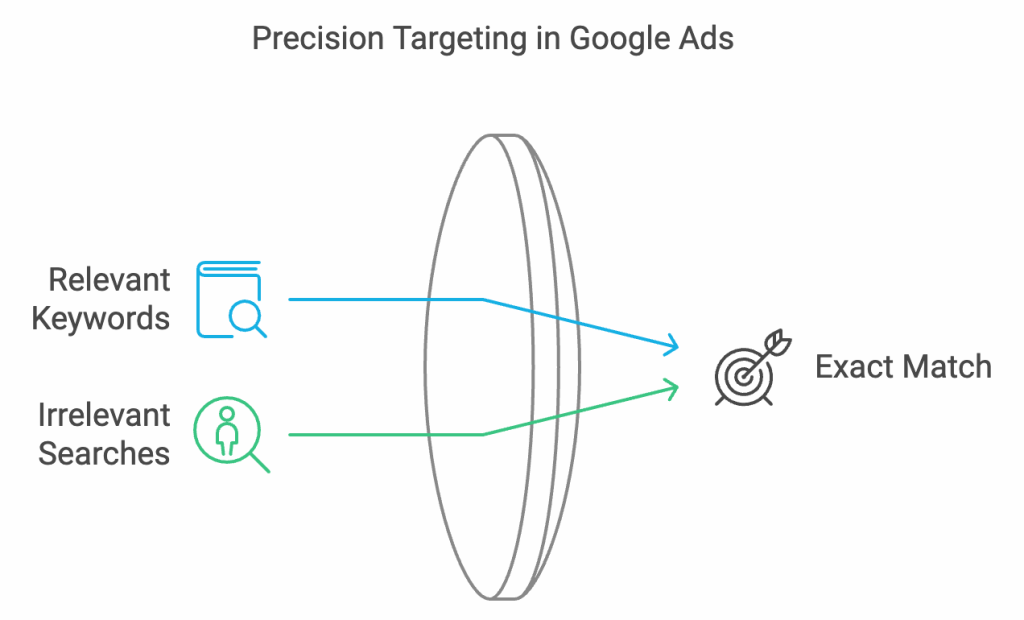Keyword Match Types Demystified: Mastering Google Ads

If you’ve ever run a Google Ads campaign, you know that getting your ads to show up in the right place at the right time is half the battle.
But did you know that understanding the different keyword match types in Google ads can give you a competitive edge? Many business owners and marketing managers overlook this crucial detail, but learning how to master these match types can help you spend your ad budget more wisely and drive better results.
I remember when I first started managing Google Ads campaigns (almost 10 years ago!) — it was a bit like throwing spaghetti at the wall to see what stuck. I set up campaigns with broad match keywords, hoping to catch as many leads as possible, only to find my ads showing up for searches completely unrelated to my business.
That’s when I realized how important it is to understand keyword match types. Let’s break them down so you can avoid those wasted clicks and make every dollar count.
What Are Google Ads Keyword Match Types?
Before we dive into the specifics of each keyword match type, let’s start with the basics. Google Ads keyword match types determine how closely a user’s search query needs to match your selected keywords for your ad to appear.
There are four main types:
- Broad match
- Phrase match
- Exact match
- Negative keywords

Each match type has its own strengths and weaknesses, and the key to success lies in choosing the right one based on your campaign goals. Get this right, and you’ll have a finely tuned ad strategy that delivers results.
Broad Match: Casting a Wide Net

How Broad Match Works
Broad match keywords are like casting a wide net when fishing. Your ad can show up for a variety of related searches, even if they’re not an exact match to your keyword. For instance, if you use the broad match keyword “coffee shop,” your ad might appear in searches for “best café near me” or even “buy espresso machine.”
When to Use Broad Match
Broad match is great when you’re trying to discover new opportunities or get your brand in front of a large audience. However, proceed with caution—it’s easy to spend a lot of money on irrelevant clicks if you don’t monitor your campaigns closely.
The trick is to start broad, then analyze your Search Terms Report regularly to see what’s working and adjust from there. Adding negative keywords (which we’ll get to) helps refine your targeting.
Broad Match Case Study
We worked with a high-growth client in the roofing industry who wanted to build awareness across multiple cities. We started with exact and phrase match keywords to build conversion data.
Then once we had >30 conversions per month per campaign, we rolled out broad match keywords around terms like roofing services, which brought in a lot more traffic. But the traffic wasn’t always relevant. By continuously optimizing and adding negative keywords like “DIY roofing,” we managed to lower the clients cost per lead and improve the campaign’s ROI. It’s a process, but it’s worth it.
Phrase Match: Targeting Specific User Intent

How Phrase Match Works
Broad match is a wide net, but phrase match keywords are much more focused. Your ad will appear when users search for the specific phrase you’re targeting, plus any close variations. For example, if you’re targeting “coffee shop” with phrase match, your ad could show up for “best coffee shop in Dallas,” but not for “best tea shop.”
When to Use Phrase Match
Phrase match is ideal for campaigns where you want to reach people with more specific intent but still maintain some flexibility. If you’re running a local business like a PPC agency in Dallas, using phrase match ensures your ad shows up when people search for “best PPC agency in Dallas” or “Dallas Google Ads services.”
Maximizing the Benefits of Phrase Match
To get the most out of phrase match, pair this match type with plenty of negative keywords to avoid irrelevant clicks. For instance, if you run a marketing agency but don’t offer social media services, you can use “social media” as a negative keyword to prevent your ad from showing for those queries.
Exact Match: Slightly More Precision (But Not Perfect)

How Exact Match Works
When you want precision, exact match keywords are the way to go. Your ad will only appear when the search term matches your keyword exactly or is a close variant. For example, the exact match keyword [coffee shop] will only trigger your ad for searches like “coffee shop” or “coffee shops near me.”
When to Use Exact Match
Exact match is perfect when you’re targeting a very specific audience. If your business serves a niche market or if you know exactly what your potential customers are searching for, this is the match type for you. It’s especially useful when running high-intent campaigns where every click matters, like for a B2B PPC campaign or a Google Ads consultancy.
Exact Match Success Stories
One of our clients, a B2B software company, was struggling with lead quality. We switched all campaigns to exact match keywords and focused on very specific search terms exactly related to their niche service offering.
Almost immediately, we saw a dramatic improvement in conversion rates and lead quality because the traffic was so much more qualified.
Negative Keywords: Preventing Wasted Ad Spend
How Negative Keywords Work
Let’s face it—wasting money on irrelevant clicks is frustrating.
That’s where negative keywords come in. By adding negative keywords to your campaign, you can prevent your ad from showing for searches that won’t convert. For example, if you run a paid search campaign for pest control, you might want to add “free” as a negative keyword to avoid clicks from people looking for DIY solutions.
Why Negative Keywords Are Essential
Negative keywords are crucial for controlling your ad spend and focusing your efforts on high-intent searches. Regardless of match type. They help filter out unwanted traffic, saving your budget for the searches that really matter. In fact, we regularly revisit and update our client’s negative keyword list every week, especially after reviewing the Search Terms Report.
How to Choose the Right Match Type for Your Google Ads Campaign
Analyze Your Goals and Audience
The first step in choosing the right keyword match type is understanding your campaign goals. If you’re trying to build awareness for a new product, broad match might be the way to go. If you want to drive conversions from people who are ready to make a purchase, exact match could be your best bet. Always keep your audience in mind—who are they, and what are they searching for?
Combine Match Types for Better Results
In our experience, using a combination of match types often yields the best results. For example, you can use broad match to explore new opportunities, phrase match to target specific intent, and exact match to focus on high-value queries. This way, you can cover all your bases while optimizing your ad spend.
Use Negative Keywords to Refine Your Strategy
Don’t forget to regularly update your negative keyword list to filter out irrelevant searches. This simple step can dramatically improve your ROI and save you from wasted clicks.
Best Practices for Managing Keyword Match Types
Regularly Monitor and Optimize Your Campaigns
Google Ads isn’t a “set it and forget it” platform. We recommend checking in on your campaigns at least once a week (but ideally more) to see how your keywords are performing. Make adjustments as needed—sometimes a small tweak to your match types can make a big difference in performance.
A/B Testing Keyword Match Types
Don’t be afraid to run A/B tests to compare different match types in your campaigns. Sometimes the best way to find out what works is to experiment with a few options. For instance, try setting up a Google Ads experiment using phrase match in the control campaign and broad match in the experiment campaign to see which one drives better results.
Common Mistakes to Avoid When Using Keyword Match Types
Over-reliance on Broad Match Keywords
Relying too heavily on broad match can result in wasted ad spend, especially if you’re not using enough negative keywords. Keep an eye on your campaign performance, and don’t be afraid to narrow your focus if you’re seeing too many irrelevant clicks.
Neglecting Negative Keywords
We’ve seen businesses waste tens of thousands of dollars simply because they didn’t use negative keywords. Make it a habit to update your negative keyword list regularly to keep your campaigns as efficient as possible.
Not Testing Different Match Types
If you’re not testing different keyword match types, you’re missing out on valuable insights. Run small tests, gather data, and use those learnings to fine-tune your strategy.
Conclusion
Mastering Google Ads keyword match types is key to building a successful campaign. Whether you’re targeting broad audiences or highly specific queries, choosing the right match type—and using it correctly—can make all the difference. Remember to monitor, optimize, and experiment to keep your campaigns performing at their best.
